UTD Celebrates Innovative Educators, Teaching Excellence at Event
By: Phil Roth | June 3, 2022
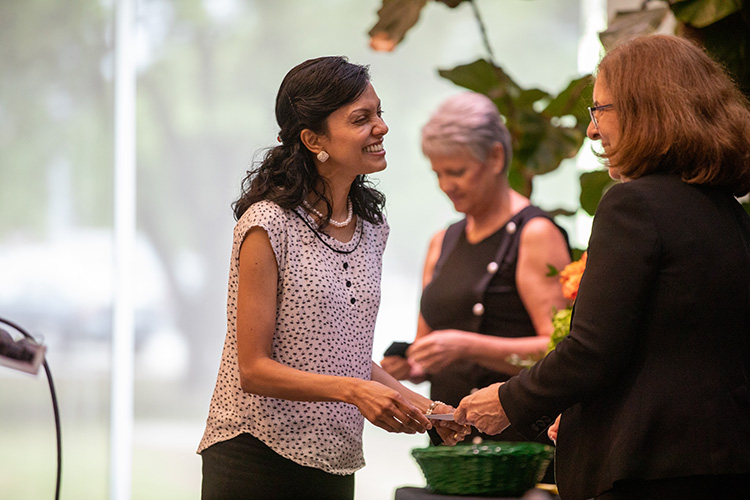
The University of Texas at Dallas recently honored five educators with annual President’s Teaching Excellence Awards, while 48 others were recognized for their completion of a national classroom teaching course.
“Teachers have such a great influence on their students,” said UT Dallas President Richard C. Benson, the Eugene McDermott Distinguished University Chair of Leadership. “We are so fortunate to have some of the most committed and innovative instructors in the country on our campus.”
The UT System partnered with the Association of College and University Educators (ACUE) to offer a course in effective teaching practices to select faculty members. After completing 25 modules over two semesters, faculty received certificates in effective college instruction from the ACUE and the American Council on Education. These credentials distinguish faculty and institutions for their commitment to educational excellence.
A recent ceremony honored 21 faculty members who completed the course in 2020-2021 and 27 who completed it in 2021-2022. Also honored were five who received President’s Teaching Excellence Awards.
The teaching excellence awards committee receives hundreds of nominations every year and considers a broad spectrum of eligible candidates from across the University. The award comes with a stipend, and recipients are presented with medallions.
This year’s honorees represent the School of Arts and Humanities, the School of Behavioral and Brain Sciences, the Erik Jonsson School of Engineering and Computer Science, and the School of Natural Sciences and Mathematics.
President’s Teaching Excellence Award in Undergraduate Instruction (tenure-track)

Dr. John Zweck, professor of mathematical sciences
What was the best part of your teaching experience this year?
First, being back in the classroom in person was phenomenal. Second, I discovered that the romantic partner of the French philosopher Voltaire was mathematician Émilie du Châtelet. She translated Newton’s Principia into French and annotated it with her own additions to the theory of calculus and physics. While telling du Châtelet’s story, I was struck by how interested the women were. There are so few women mathematicians who are widely known and celebrated from before about 1950.
What is your teaching philosophy?
I focus my energy on developing student learning and creative problem-solving. Creativity requires us to grapple with conceptual meaning, which is achieved when we combine disparate ways of thinking. Because solving problems is so challenging, we developed an active learning method in the weekly problem sessions. During these sessions, students solve problems in small groups at whiteboards and explain their work. Listening to students engage with the material as they learn to talk math with each other has been an incredibly satisfying experience.
What’s your advice for someone teaching undergrads for the first time?
Challenge your students, but provide them support mechanisms to increase their chance of success. Start the semester by talking with your students about how to become effective learners. Design assessments that focus students’ attention on what you want them to learn, and set up an environment that promotes student engagement. Teach the same course year after year. Learn from last year’s mistakes. Each year, spend a week prior to the semester designing one improvement to the course aimed at increasing the effectiveness of student learning. Take pedagogical risks. Avoid the trap of aiming to get high scores on your course evaluations. Instead, learn from the comments thoughtful students provide. Be easy on yourself.
President’s Teaching Excellence Award in Undergraduate Instruction (non-tenure-track)
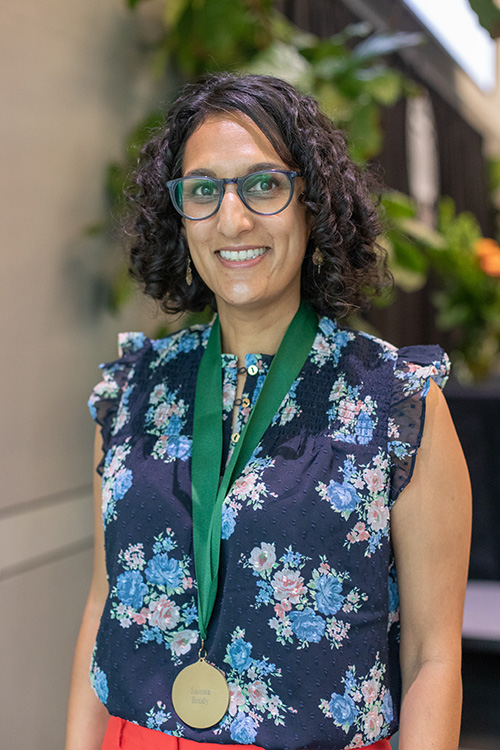
Dr. Salena Brody, professor of instruction in psychology
What was the best part of your teaching experience this year?
The return to the classroom. It nearly moved me to tears the first time students erupted in laughter during a lecture. Until that moment, I hadn’t realized just how much I missed the sound, the magic and the energy that comes from physically being together.
What is the most rewarding part of teaching?
I’ve been teaching for over 20 years, and it’s so rewarding to hear from students years later and see where their lives have taken them. It’s so special when a student recalls your course as transformational and that you made a difference in their lives. I recently reconnected with my first grade teacher to let her know what a difference she made in my life. Her small act of kindness one day after school transformed me from feeling invisible to feeling seen. Her kindness reminds me that you never forget how someone made you feel, and I try to carry this with me in the classroom.
What is one of your favorite memories from teaching at UTD?
I was teaching a night class a few years ago that happened to fall on my 14th wedding anniversary. I joked that I would be spending my anniversary with them instead of with my spouse. They secretly planned a feast and completely surprised me with a fantastic party and even an anniversary card when I walked into class.
President’s Teaching Excellence Award in Graduate/Professional Instruction
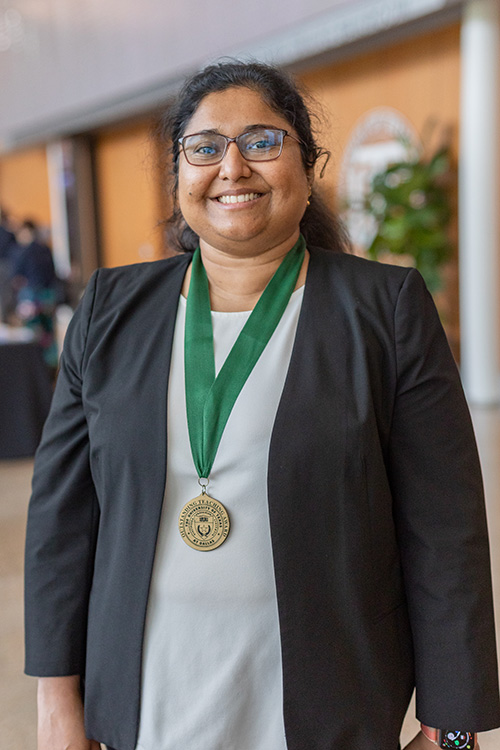
Dr. Shalini Prasad, professor and head of bioengineering, Cecil H. and Ida Green Professor in Systems Biology Science
What makes an excellent teacher?
An excellent teacher finds the balance between pedagogy and personalized learning. In graduate education, it is almost like captaining the “Star Trek” Enterprise and charting the course for new scientific discoveries.
What’s the best advice you’ve received about teaching?
Teaching has to model the Goldilocks effect — getting content delivery integrated with learning just right.
What would the students be surprised to find out about you?
I am a polyglot who uses visual memory to speed-read.
What is one of your hidden talents?
I am a “STEMinist” [someone who advocates for equal representation of social groups in science, technology, engineering and math] trained in the performing arts. I also can tell you the day of the week if you can give me a date and year — most of the time.
What is one of your favorite memories from teaching at UT Dallas?
Every year, the student teams perform a teardown of a sensor technology. One team presented me with all the torn-down parts, including the nuts and bolts, and encouraged me to reassemble it for fun. My sons and I spent some time working on “rebuilding” the sensor.
What is your teaching philosophy?
Anyone can memorize facts and figures, but, to really learn something, you have to go out and do it for yourself. Just follow your curiosity.
President’s Teaching Excellence Award in Online/Blended Instruction
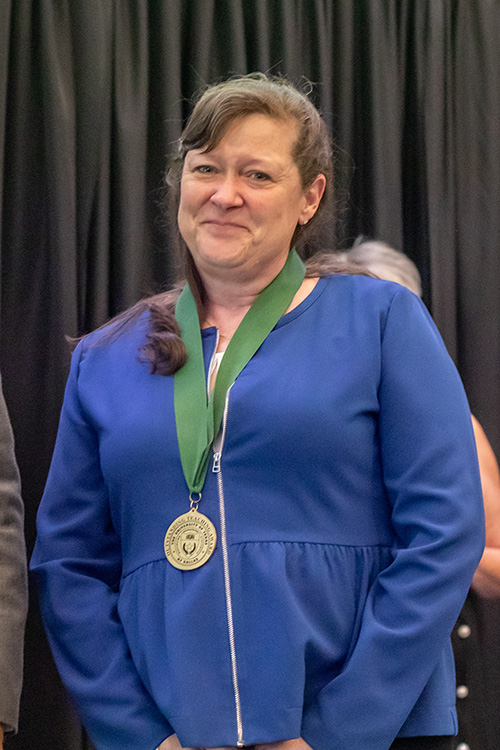
Dr. Carie S.T. King, clinical professor of communication and rhetoric
What was the best part of your teaching experience this year?
By midterm in spring, one-third of my students had interviews or internship offers. I was excited to hear about their successes and honored that they shared the news with me.
What helped you become successful this year?
Much of my success is because of the people with whom I work. We are a close community of instructors who collaborate well, challenge each other and invest in our students together.
What would the students be surprised to find out about you?
I went to graduate school to improve my editing skills. I did not anticipate becoming a professor. One of my professors invited me to teach a class. I’m so glad that professor saw potential in me and challenged me to do something new.
What is one of your hidden talents?
I love to sing. I studied piano, voice and opera, and, when my children were young, I performed on the stage in community theater.
What is the most rewarding part of teaching?
Nothing is better than seeing a student “get it” or hearing about their successes. One of my favorite days is commencement, when I get to see the students succeed.
What’s your advice for someone who wants to improve their online teaching abilities?
Online teaching requires a simple, consistent, predictable structure that students can use to work through the course materials in a logical fashion. Additionally, online teaching requires that the instructor be committed to regular and skilled communication.
President’s Teaching Excellence Award for Teaching Assistants
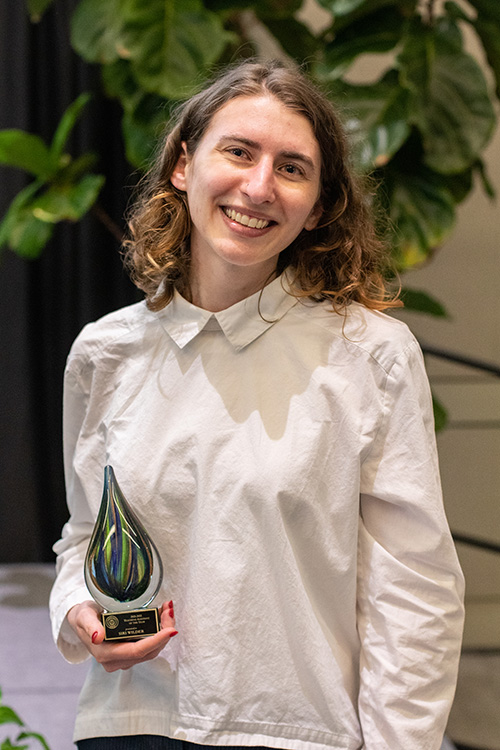
Siri Wilder, graduate student in psychology
What was the best part of your teaching experience this year?
Connecting with students and sharing the learning experience with them throughout the semester. Hearing their perspectives and ideas on different topics is transformative and has made me think differently about a lot of things.
What has helped you grow as a teacher?
Guidance and support from my wonderful mentors and feedback from my students. I am so influenced by each of my mentors, and the biggest thing that I’ve learned from them is the importance of giving others grace and kindness. I have learned so much from my advisor, Dr. Karen Prager, and from Dr. Joanna Gentsch, with whom I’ve worked. I wouldn’t be where I am without their guidance and support.
What is one of your favorite memories from teaching at UT Dallas?
My best memories are always of having discussions with students where they are building on each other’s ideas. It’s so exciting to be able to talk things through and build a greater understanding of a topic together.
Media Contact: Phil Roth, UT Dallas, 972-883-2193, phil.roth@utdallas.edu, or the Office of Media Relations, UT Dallas, (972) 883-2155, newscenter@utdallas.edu.





